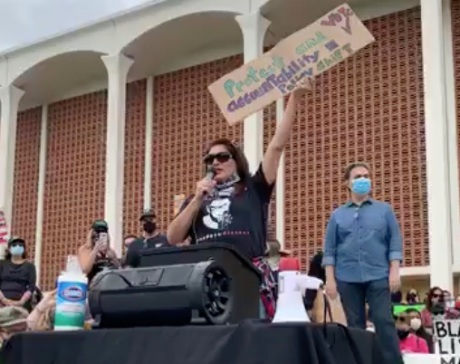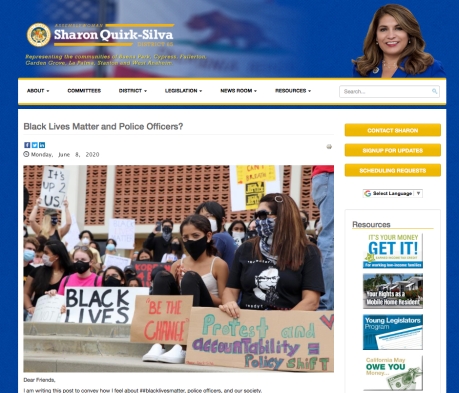
Assemblywoman Sharon Quirk-Silva speaking to a Black Lives Matter demonstration, June 6, 2020.
Matthew Leslie
Turning and turning in the widening gyre
The falcon cannot hear the falconer;
Things fall apart; the centre cannot hold;…
From The Second Coming, W. B. Yeats, 1919*
Perhaps it is both banal, because it is done so often, and inappropriate because the author was white, to reference the Irish poem The Second Coming to comment on the words of a Latinx lawmaker about Black Lives Matter protests, but the poem was good enough for the Nigerian author Chinua Achebe to borrow a line for his landmark novel Things Fall Apart and, to the occupying English, the Irish weren’t exactly white, not like them, anyway.
Yesterday 65th Assembly District Representative Sharon Quirk-Silva (D, Fullerton) posted a short essay to her official website Entitled Black Lives Matter and Police Officers?

Quirk-Silva opens by asking “can you support #BLM and Police Officers at the same time?” and follows with her immediate answer “Some say no, but I say you can.” She qualifies her thanks to the “noble and honorable” “majority” of police officers with the observation that black men and women face “issues with enforcement or blatant, long-term oppression,” but then veers completely off the subject for most of the rest of the piece to address systemic racism in every other area of society than policing itself. “…activities such as jogging, going to the market, going to school, can all be everyday activities for most, but if you are a person of color, these activities are risky, depending on who you might encounter,” like the police, we might ask?
She continues, writing of her appearance at a June 6 demonstration on the lawn in front of Fullerton’s City Hall, where she herself had served two full terms on the city council. Speaking to a crowd estimated to be around 1,500 that day, she held a handmade sign reading “Protest and accountability = Policy Shift “ (the sign appears in an image accompanying her June 8 post). On that day, she recalled “Right here, twelve years ago (sic)** there was a death, how many of you remember Kelly Thomas?,” stating that there were similarities between that case and that of George Floyd, murdered in the streets by Minneapolis police this year.
Kelly Thomas was white. He was marginalized by society for his mental illness, but like George Floyd, he was suffocated in a street by police officers. In the aftermath of his killing, officials tried to shift attention from the brutality of police to the generally abysmal condition of homeless and mentally ill people. Similarly, Quirk-Silva’s essay shifts focus from police killings to other forms of intolerable institutional and societal racism.
There was a death…yes, there was, a brutal, prolonged, and unnecessary one at the hands of Fullerton police, but Quirk-Silva chose to speak of that killing in the passive voice, and not once during her brief comments that day did she utter the word “police,” even though she was addressing a demonstration against police brutality across the street from the headquarters of the Fullerton Police Department.
Tellingly, she recalled then-OC Human Relations Director Rusty Kennedy advising her twenty years ago when she was a teacher that standing by while people were being demeaned or bullied, or tolerating racism, made us all part of it. Wise words, but Rusty Kennedy later opposed efforts to institute a civilian police board in Fullerton in the wake of the killing of Kelly Thomas.
“We need to stop brutality, we need to stop looking the other way,” she said, not looking at the police station a couple of hundred feet to her left. She anticipated state bills within the next few weeks and promised to make the right vote on behalf of all of us, but declined to specify exactly what these bills would address. One can only hope they are substantial attempts to address the killings of people of color. Generalizing about institutional racism does little good when one refuses to take on the institutions that perpetuate it.
Two days later, she concluded her post about police and BLM by declaring “In no way do I want to defund police.” Her declaration flies squarely in the face of a central demand of the Black Lives Matter organization, who have been the driving force of nationwide protests: “We call for a national defunding of police. We demand investment in our communities and the resources to ensure Black people not only survive, but thrive.”
Sharon Quirk-Silva has described herself as someone who legislates from the center, avoiding extreme positions, but there comes a time when that center will not hold. There is no use in trying to occupy a middle ground that no longer exists. Either one stands for stopping unfettered brutality by police toward people of color—or anyone, or one stands by and becomes part of it.
* Written during the Irish rebellion and the great influenza pandemic.
** Kelly Thomas was killed on July 5, 2011


Equally city counciman Zhara got a little sidetracked by bringing attention to discrimination of any group and then reference the GLB flag flying on the city pole nearby as an accomplishment giving credit to city council Silva for making this happen… He figured it must have been assumed that this police brutality was really racial discrimination and thereby any group that doesn’t feel accepted could be tied in with BLM. How about defund the police ( be it overfunded ) and fund the streets… After all it was the overfunfed police that killed Kelly… Because it took an practily army to take down one ” crazed” unarmed homeless man at the bus terminal…. Instead of one or teo officer using good sense.
LikeLiked by 1 person
Stay tuned.
LikeLike
What courage. Like when she truck up three different positions on Poseidon depending on whom she was talking to.
LikeLike